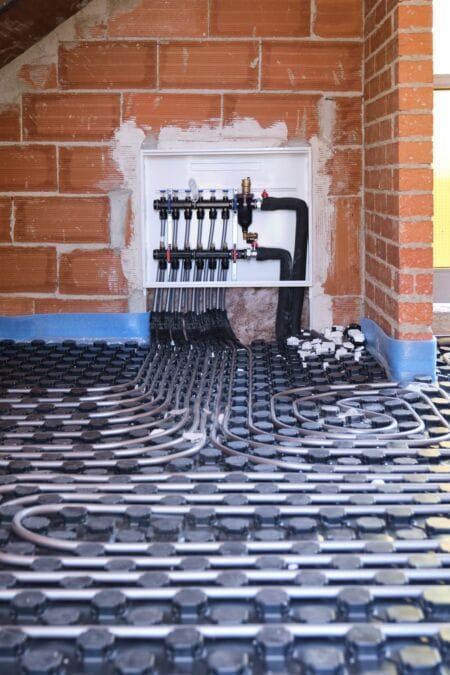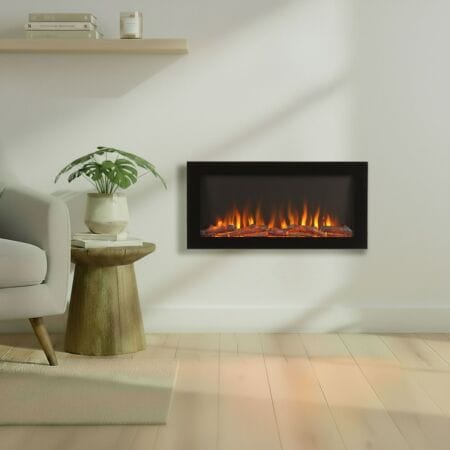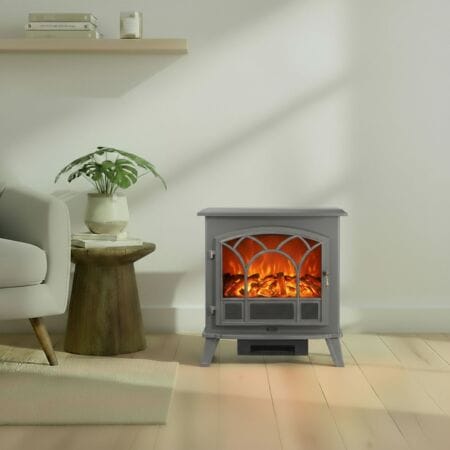Contents
ToggleWhat we'll cover...
If it is worth fixing that old radiator, or if it is time for an upgrade.
Here’s how to tell.
The cost of staying warm
You know you’ve hit peak adulthood when you start Googling “how much does it cost to replace a radiator?” at 11pm while your radiator’s doing its best Chewbacca impression.
Whether you’re fixing a leaky radiator valve, battling cold spots, or upgrading to something sleeker and more stylish (hello, anthracite designer radiator), radiator repairs and replacements can be a minefield of quotes, jargon, and “it depends” pricing.
So, this comprehensive guide will provide the lowdown on radiator costs – from quick fixes to full upgrades – and all the hidden extras no one tells you about until your plumber’s halfway through the job and it’s already twice as much as you were expecting to pay.
All cost ranges are based on reputable 2025 estimates from Checkatrade, MyBuilder, and BestHeating’s own insights – plus a generous helping of lived experience (and a few mistakes we’ve learned from).
Average cost to repair or replace a radiator
A standard radiator leak repair can be expected to set you back up to £180, with a basic radiator replacement job costing up to £300, but there are several nuances with radiator repair and replacement work.
This section will help you decide whether radiator repair or replacement is the best option for your circumstances, and below is a quick overview of what you can expect to pay for the most common radiator jobs in 2025.
Job Type | Average Cost (UK, 2025) |
Radiator leak repair | £70 – £180 |
Valve replacement | £50 – £130 |
Bleed & rebalance | £50 – £100 |
Power flush (entire system) | £300 – £600 |
Basic radiator replacement | £150 – £300 |
Radiator removal + new install | £200 – £450+ |
Cost to move a radiator | £150 – £400 |
Labour cost (per radiator) | £100 – £200 |
Disclaimer: Prices vary based on location, job complexity, plumber’s tea preference, and whether your heating pipework plays nice.
Radiator repair costs: When a quick fix is enough
Leaks - The slow, sneaky wallet drainers
You might have gathered that we love radiators more than most at BestHeating. But we know all too well about their annoying propensity to leak in awkward places when you’re not looking on occasion. Leaks often occur due to corroded valves, pipe joints, or rusted seams.
Typical repair cost:
- Labour: £60–£120
- Replacement valve/part: £10–£50
- Time: 1–2 hours
- Extra biscuits for the plumber: Optional, but appreciated
If your radiator is old enough to remember Definitely Maybe being released the first time round, it may not be worth repairing. Corrosion often signals the end of the line.
Cold spots and underperformance
Is your radiator hot at the top and cold at the bottom? Or the other way around? These symptoms usually point to:
- Trapped air in the system (bleed your radiators)
- Sludge build-up (requires a system flush)
Repair cost:
- Bleeding: Free if DIY, £50–£70 if done professionally
- Chemical flush (single radiator): £100–£150
- Power flush (whole system): £300–£600
As an aside, our guide on how to improve radiator efficiency & performance can offer further tips to ensure your radiator is working with optimal efficiency.
Faulty valves
Valves are the unsung heroes of your heating setup. That is, until they fail. A broken TRV (thermostatic radiator valve) can leave you shivering or sweating, probably right when required the most.
Repair cost:
- New TRV or lockshield valve: £15–£40
- Labour: £50–£100
- Time: 1 hour
When to replace instead: If multiple valves are failing or your heating system is unbalanced, it might be more cost-effective to upgrade entirely.
Radiator sludge
Sludge = rusty residue + limescale + debris. It clogs pipes, restricts heat, and makes your radiators operate inefficiently.
Flush options:
- DIY flush: £20–£40 (if you know your way around central heating inhibitor and hoses)
- Professional chemical flush: £150–£250
- Full system power flush: £300–£600+
If one radiator’s cold, flush that one. If all radiators are sluggish, it’s best to commence with a full system flush.
Typical cost breakdown:
Item | Cost Range |
Standard horizontal radiator | £50–£150 |
Designer or vertical model | £150–£400+ |
Labour (inc. removal) | £100–£200 |
New valves | £15–£50 |
Pipework adjustments | £30–£100+ |
Time to install? Most swaps take two to four hours – unless your floor is granite, your walls are wonky, or your pipework looks like spaghetti junction.
New radiator costs: Buying from scratch
Whether you’re designing your dream living space or kitting out a handy utility room, choosing a brand-new radiator is where form meets function (and price tags can vary wildly).
Here’s a snapshot of the 2025 price range by radiator type:
Radiator Type | Estimated Cost (unit only) |
Single panel convector | £50–£100 |
Double panel convector | £90–£160 |
Column radiator (horizontal) | £120–£250 |
Vertical designer radiator | £180–£500+ |
Anthracite flat panel radiator | £150–£300 |
Heated towel rail | £50–£200 |
Designer radiators cost more, but tend to make up for the heftier tag with higher BTU output and serious visual impact.
Additional radiator repair and replacement cost factors
Radiator pricing rarely pertains to just parts and labour. Here are some of the extra costs that can sneak up on you if you don’t keep your eye on the ball:
Job complexity
The more unusual your setup, the longer it takes. Radiators mounted on alcove walls, behind kitchen units or with awkward floor joists below will take longer (and cost more).
Wall type
- Solid brick: Great for strength, harder to drill
- Plasterboard: Needs specialist fixings
- Dot and dab: May require long-frame fixings or extra tools
Pipework access
If your pipes are boxed in, behind furniture, or hidden under fancy new flooring, your installer may need to lift boards, cut skirting, or make awkward compromises.
Emergency call-outs
Sunday morning leak? Expect an extra £100–£200 for emergency services.
Removal and disposal
Some plumbers charge £20–£50 to dispose of old radiators (especially cast iron radiators, which have no chance of fitting in your wheelie bin).
Getting the best value for your radiator budget
Here’s how to avoid buyer’s remorse, and make your heating investment count:
– Use a BTU calculator to size your radiator correctly. Our guide on how to calculate the right BTU for your room can also assist
– Bundle radiator jobs together where possible to save on callout/labour
– Select reliable valves and fittings, as opposed to the cheapest options
– Ask your installer to provide a full written quote before the work begins then there are no surprise extras
Ready to fix or upgrade your radiator with BestHeating?
Whether it be quick repair work or a full-on designer upgrade, BestHeating has the tools, products, and know-how to help you do it right.
Explore our full collection of stylish modern heating solutions online, including electric designer radiators, smart heating systems and much more, and let us know what made the cut in your radiator replacement job.
You can reach us in the comments below, or via Instagram, Facebook or X.
John is a Research Specialist for the Best Heating Advice Centre, where for over nine years he has dedicated himself to demystifying home heating for our customers. He specialises in creating clear, data-driven guides and how-to articles by collaborating directly with our team of certified heating experts and product engineers.
His work, built on a foundation of journalistic research, has helped millions of readers make confident and informed decisions about their home heating. When he’s not breaking down the heat output differentials from radiators to heated towel rails, John fancies himself as a fine football and music connoisseur.










